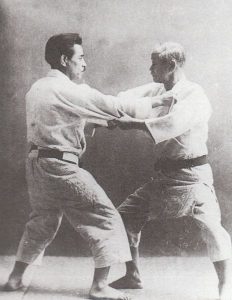Oorsprongsverhalen: Feit of fictie?
Toen ik voor het eerst begon te trainen in vechtsporten in 1995, De verhalen die verbonden waren met de oprichting van de meeste vechtsporten waren behoorlijk fantastisch met bovenmenselijke prestaties van fysieke bekwaamheid en vechtvaardigheid die aan hun oprichters werd toegeschreven. Of kung fu, Karate of judo, De oprichter nam de vaardigheden die in eerdere vechtsporten zijn geleerd, het aangepast en iedereen versloeg. Deze claims zijn vaak een combinatie van feiten en fictie.
Toen ik begon te lezen over judo, een van de belangrijkste momenten in de vorming, waren de judo -beoefenaars dominantie van de Jujitsu School -studenten in de 1886 Toernooi georganiseerd door de politie van Tokyo. Nadat de Judoka won 10 Wedstrijden en Drew 1 match, Judo werd de dominante kunst.

Dr. Jigoro Kano en zijn student Kyuzo Mifune oefenen judo uit het publieke domein
Behalve dat veel jujitsu -scholen tot tenminste naast judo blijven bestaan 1920. Mataemon Tanabe, Een fusen-ryu jujitsu-beoefenaar, Versla verschillende leden van de Kodokan in uitdagingswedstrijden na het Tokyo -toernooi. Hoewel Tanabe de 1906 Jujitsu -conferentie gehouden door de Kodokan, Hij is nooit lid geworden van Judo.
Ik heb Taekwondo voor bijna bestudeerd 20 nu nu. Veel van de originele Taekwondo -meesters waren zwarte riemen in Shotokan Karate. Echter, Het is een controversieel onderwerp vanwege de Japanse bezetting van Korea. Als je dit feit naar boven hebt gebracht, Je zou het risico lopen uit je school te worden geschopt en soms aangevallen door de instructeur. To this day, Taekwondo Masters uit Korea zal je vertellen dat hun kunst een modernisering van Taektyeon is, Een originele Koreaanse krijgskunst.
Vanwege enkele verschillen tussen de tweede en derde generaties van de Gracie -familie, De oorsprong van de Braziliaanse Jiu-Jitsu is ook enigszins verduisterd geweest. In een recente aflevering van de Grappling Central Podcast, Robert Drysdale probeert de ware creatie van de kunst te beschrijven door historisch onderzoek. Een aantal van de verhalen die we vaak herhalen, hebben mogelijk niet plaatsgevonden op de manier waarop we denken.
Na het luisteren naar de aflevering, Ik denk dat alle BJJ -scholen een foto moeten hebben van zowel Carlos als Helio Gracie die op hun scholen hangt. Ze bouwden hun familie -erfenis samen en je kunt de kunst niet zonder hen beiden hebben.
De meeste van deze verhalen zijn gemaakt om studenten te overtuigen dat de kunst de beste is. Als ze het niet bestuderen, Ze missen iets. Echter, Als het goed is, U hoeft de oorsprong niet te verdoezelen. De kunst zal op zichzelf staan.
Pin It
